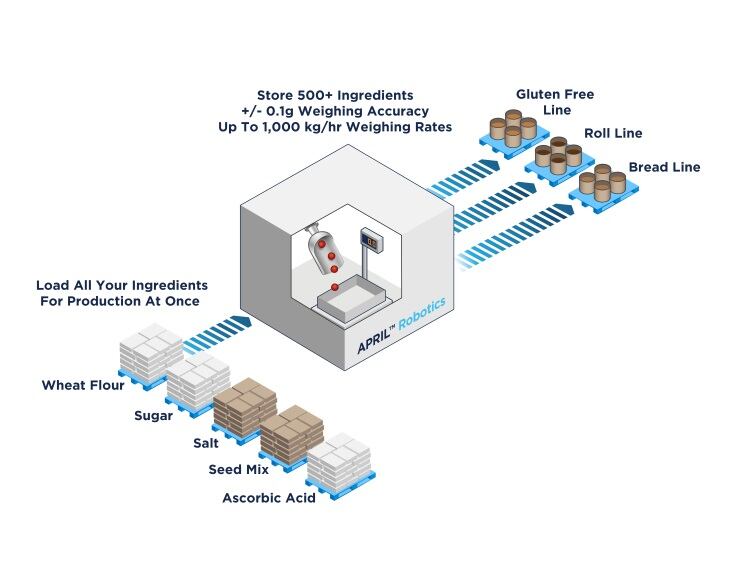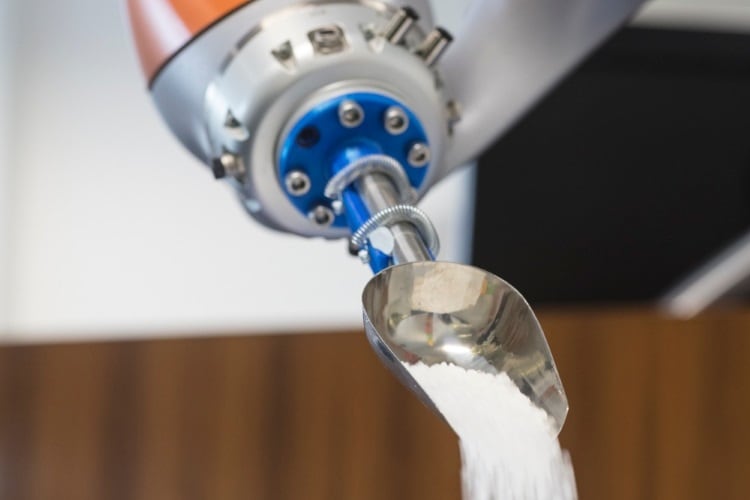
Humans have traditionally offered the greatest flexibility in terms of scaling up to meet demand, changing quantities of ingredients from one batch to the next and switching outputs at a moment’s notice. Labour in the UK and many other countries has also tended to be highly cost-effective, which makes operators an ideal solution in this area of the processing line.
However, these advantages no longer stand up against advances in bakery processing. Weighing out powders is a manual, repetitive task that is highly susceptible to human error. The latest technology to improve efficiency for this task while protecting operator health is robots, yet they have not been widely adopted in the food industry.
Combining robotics and advanced automation, bakeries can benefit from a flexible and scalable solution that delivers an accurate and cost-effective alternative to operators on the factory floor. What’s more, after a year of dealing with the pandemic, it’s become clear to many bakeries that any solution that can reduce over-reliance on labour, particularly to achieve social distancing to protect operator health, is a good thing.
Wide operating envelope

Robots today can now rival a human operator.
In the case of the APRIL Robotic Ingredient Handling system, flexibility is defined by the number of ingredients stored and the dosing range. In this instance, the use of robotics gives bakers a wide operating envelope, smoothly transitioning from weighing out a small batch of cocoa powder to a large volume of salt in the same operation with no cross-contamination or time-consuming set-up as the robot is designed to work flexibly.
The system has different programmes depending on what is needed for a given run, allowing bakers to adapt for a wide range of variables. Recipes can be either automatically set-up from your ERP or selected by your operator at the touchscreen terminal. Very little expertise is needed to operate the system, and no extra time is required to make the change, bringing all of the benefits of robotic automation without any concerns around flexibility.
What’s more, the cost of robotics is coming down, just at the point when the cost of labour is increasing. Bakers can be particularly affected due to the number of operators usually involved in micro-weighing.
The national living wage in the UK will be broadened to include everyone over 23 from 1 April 2021 while at the same time increasing by 2.2% from £8.72 to £8.91, and bakers in many other countries are also facing similar rises. Our investigations have revealed that weighing activities can cost up to 1% of a baker’s turnover, primarily due to associated labour costs. Robots will allow bakers to reduce these costs, quickly delivering a return on the upfront investment of installing a robotic system.
In addition to cost and flexibility advantages, robots also offer the edge in terms of their reliability. Fortunately, they never have an ‘off day’, they don’t forget ingredients and many industrial robots have a mean downtime average of 30 minutes per year. This means that they can operate 24/7 with increased levels of accuracy when compared to humans and with zero risk of cross-contamination (for example, thanks to dedicated ingredient containers and contact components within the APRIL Robotics Ingredient Handling system) and full traceability as you are able to track all ingredients throughout the entire process by linking the system to your ERP.
Human error
It makes sense to automate as much of the process as possible as human intervention has been found to be the second largest cause of waste in food production. A major study by Brunel University, London, and Ghent University reviewed the production processes at 47 food manufacturers in Belgium and found that human error is a major cause of food waste, accounting for 10.9%. In addition, human interaction can also be a source of cross-contamination, which can jeopardise consumer health and should be avoided at all costs.
The final area where robots outweigh humans is in terms of operator health. Powder handling in a bakery can lead to significant health concerns as exposure to dust can cause occupational asthma and rhinitis. Traditionally bakeries have had to invest in PPE or greater numbers of personnel in shorter shifts to reduce the exposure time. But in reality, the only way to protect human operators from these conditions is to remove them completely from the process, robotic systems allow bakeries to do just that. All of this is not to say that humans aren’t needed in the process, more that they could be re-deployed into more value-added roles, such as management of processes, reviews, robot programming etc. where their skills would be better used and their health could be protected.
The APRIL Robotics Ingredient Handling system automates powder weighing, offering unrivalled accuracy, efficiency and allergen control. The robot weighs out ingredients up to an accuracy of +/- 0.1g every time. The flexible nature of the systems means the APRIL system can handle both free-flowing and non-free-flowing ingredients. With exceptional storage density and an unparalleled turndown ratio for high accuracy ingredient weighing, the APRIL Robotics Ingredient Handling system offers high flexibility and can be easily integrated into existing bakeries.
Study:
Authors: Dora, M., Wesana, J., Gellynck, X. et al
Ann Oper Res 290, 47–72 (2020)


